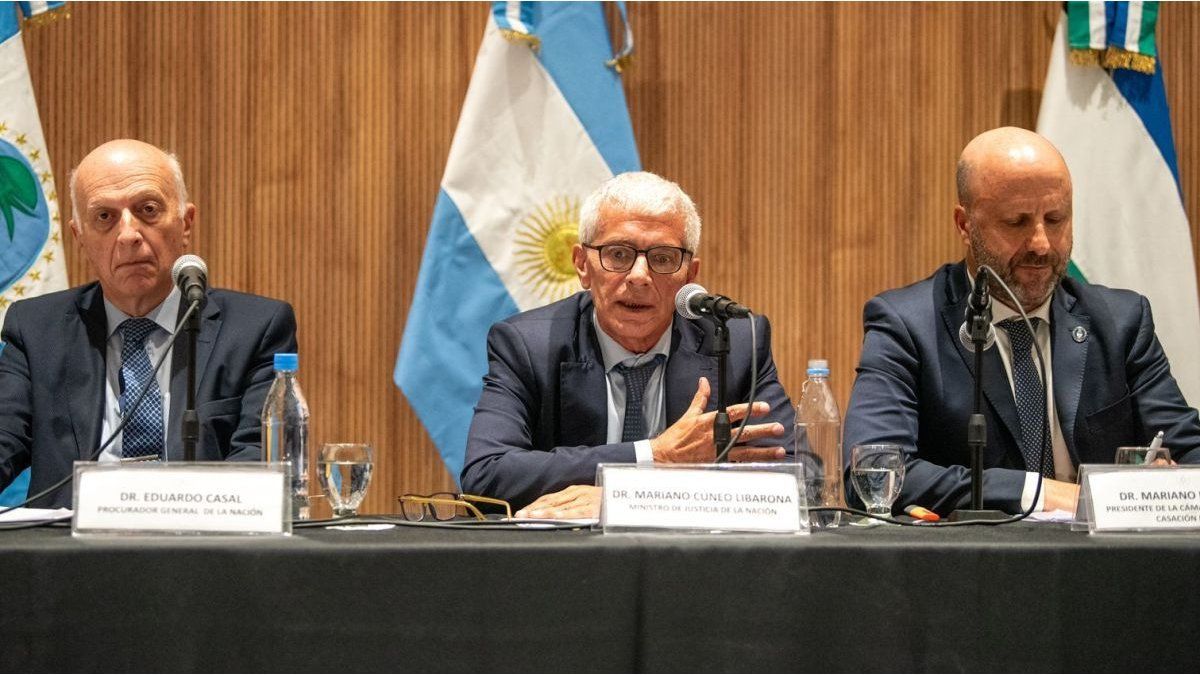“Argentines deserve justice that acts without delay and fights crime firmly, and we are achieving it,” said the Minister of Justice, Mariano Cúneo Libarona.
Cúneo Libarona stressed that “all actors in the justice system consider the guiding principles of the adversarial model and recognize its innumerable advantages over the inquisitorial model.”
The Minister of Justice, Mariano Cúneo Libaronaannounced the implementation of Federal Criminal Procedure Code in the provinces of Río Negro and Neuquén. “This new Code gives justice the tools to imprison the most dangerous criminals in hours, when before the process took years,” he said. “Argentines deserve justice that acts without delay and fights crime firmly, and we are achieving it,” he added.
The content you want to access is exclusive to subscribers.
In this sense, he exemplified: “Since the implementation of the Federal Criminal Procedure Code in May in Rosario, we were able to issue a sentence for drug trafficking in 30 days that previously took a year.” The new regulations, which establish the Accusatory Procedural Regime in the Federal order, are already operational in Jujuy, Salta, Santa Fe, Mendoza, San Luis and San Juan where “procedural times were significantly reduced, transforming the judicial system into a tool effective to confront crime and guarantee agile Justice.”


He indicated that “today we are preparing to write another page in the institutional history of our country: the inquisitorial system has ended for federal jurisdiction in the provinces of Río Negro and Neuquén.” He also detailed that the implementation of the Accusatory Code “will continue on December 2 in Chubut, Santa Cruz and Tierra del Fuego, Antarctica and the South Atlantic Islands, with the objective that the new Federal Criminal Procedure Code is fully operational throughout the country. by the end of 2026.”
In turn, Cúneo Libarona stressed that “all actors in the justice system consider the guiding principles of the adversarial model and recognize its innumerable advantages over the inquisitorial model.” He also stated that “the ultimate goal is to achieve a more just society and improve the quality of life of the inhabitants of our country.”
For this purpose, the Ministry of Justice together with the Public Prosecutor’s Office, the Executive Branch of the Province of Neuquén, the Superior Court of Justice of Neuquén and the Public Prosecutor’s Office of Neuquén, will carry out the necessary steps to “enable the use of forensic laboratories to carry out expert reports, analyzes or forensic practices, when prosecutors consider it necessary.” In this regard, Cúneo Libarona stated that “it is an enormous change: before the federal justice system did not have laboratories to analyze drugs. Now, thanks to the cooperation of the Neuquén Public Prosecutor’s Office, we have the necessary tools to combat organized crime and put an end to impunity for criminals.”
Finally, I conclude: “The process is already underway and showing concrete results. We continue working to build firm and swift justice, truly at the service of Argentines. “The National Government proposed to complete once and for all an unavoidable reform, which we have procrastinated for forty years.”
Source: Ambito
I am an author and journalist who has worked in the entertainment industry for over a decade. I currently work as a news editor at a major news website, and my focus is on covering the latest trends in entertainment. I also write occasional pieces for other outlets, and have authored two books about the entertainment industry.




